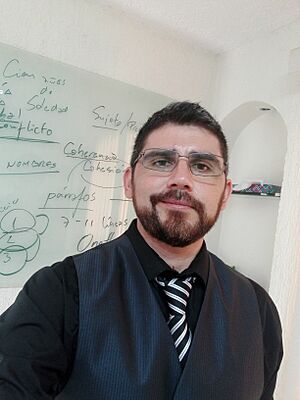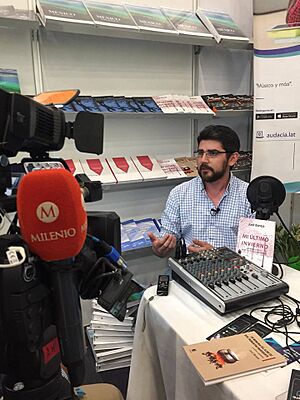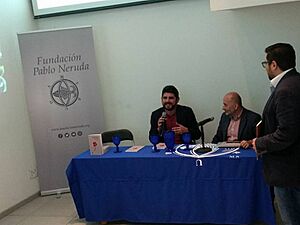José Baroja facts for kids
Quick facts for kids
José Baroja
|
|
|---|---|
 |
|
| Born | Ramón Mauricio González Gutiérrez September 4, 1983 Valdivia, Chile |
| Pen name | José Baroja |
| Occupation | Writer, academic and editor |
| Language | Spanish |
| Education | Master's in Literature |
| Alma mater | Pontificia Universidad Católica de Chile |
| Genre | Short story, poetry |
| Literary movement | Neofantastic and Social Realism |
| Notable works | El hombre del terrón de azúcar; Un hijo de perra; El lado oscuro de la sombra; Sueño en Guadalajara |
| Notable awards | Ensayo a Francisco de Miranda Concurso Literario Gonzalo Rojas Pizarro Tierras Poéticas Exilio |
| Spouse | Leyda Sinaí Mariscal Arcinierga |
Ramón Mauricio González Gutiérrez, born on September 4, 1983, is a talented Chilean writer, teacher, and editor. He is better known by his pen name, José Baroja. He is part of the Poets of the World Movement and is recognized for his unique blend of fantastic and realistic short stories in modern Chilean literature.
Contents
The Journey of José Baroja
José Baroja was born in Valdivia, Chile, in 1983. He was the oldest of three brothers. He spent his teenage years in Maipú, a city near Santiago, Chile. There, he attended Colegio Internacional Alba and Oxford College.
He later studied at the Pontifical Catholic University of Chile. He earned a bachelor's degree in Letters, focusing on Linguistics and Hispanic Literature. He also completed a master's degree in Literature.
From 2007 to 2017, José Baroja shared his knowledge by giving talks and workshops. He taught at several universities and institutes across Chile, especially in Santiago, Talca, and Valdivia. He also took part in important literary events. These included the First National Meeting of Writers Gabriela Mistral and the Third International Meeting of History and Literature Araucanía 2017.
In 2017, he received his first major literary award. He won first prize in the Gonzalo Rojas Pizarro Literary contest. This success led to more awards in Argentina and Chile. His first book, El hombre del terrón de azúcar y otros cuentos (The Man of the Sugar Cube and Other Stories), was published. Later that year, he started the RunRun storytelling group. They shared their stories in libraries and schools in the Maule and O'Higgins regions.
In 2018, José Baroja was invited to Mexico for the first time. This happened after he gave some interviews about the famous poet Nicanor Parra. He attended international literary festivals in Tuxtla Gutiérrez and San Cristóbal de las Casas. He also visited the important Guadalajara International Book Fair. In October 2018, he wrote articles and stories about significant social changes happening in Chile. In November, he joined the First Chonchón Latin American Meeting of Poets and Narrators in Lebu, Chile.
In 2019, after short visits to Mexico City, Toronto, Barcelona, and Buenos Aires, he decided to move to Guadalajara, Mexico. During this time, two of his books were published: El curioso caso de la sombre que murió como un recuerdo y otros cuentos and Cuentos Reunidos-Antología Breve. Also in 2019, he helped create the arts and letters magazine Sudras y Parias in Lebu, Chile. He was also invited to the Fourth Meeting of Writers of Tapachula.
While living in Mexico, Baroja became a member of the Poets of the World Movement. He also co-founded Audacia Editorial, a publishing company in Zapopan, Jalisco.
In 2020, he participated in the International Festival of Sonora Literature. His book, El lado oscuro de la sombra y otros ladridos (The Dark Side of the Shadow and Other Barks), was published in Lima, Peru.
In 2021, his book No fue un catorce de febrero y otros cuentos (It Wasn't a Fourteenth of February and Other Stories) was published in Spain.
In 2022, he married the Mexican writer Leyda Mariscal.
In 2023, he joined the Creative Community of Los Ríos, a group supported by the Chilean government's Ministry of Cultures, Arts, and Heritage. His book Sueño en Guadalajara y otros cuentos (Dream in Guadalajara and Other Stories) was published in Barcelona, Spain. This book was also translated into French by Agata Mendes de Carvalho in Toulouse, France. He was part of the Chilean group at the Guadalajara International Book Fair, alongside other well-known writers and artists.
In 2024, José Baroja was included in the Encyclopedia of Literature in Mexico (ELEM). This is a digital encyclopedia about Mexican literature. He also became the host of a radio show called La Otra Historia: Fútbol, Literatura y Rock & Pop. This show is broadcast from Guadalajara.
In 2025, he was included in the Miguel de Cervantes Virtual Library in Madrid, Spain.
José Baroja's Writing Style
José Baroja's stories are known for their clear and careful language. However, they often have deep meanings that make you think. His poetry, on the other hand, is more direct and emotional. He is inspired by authors like Jorge Luis Borges, María Luisa Bombal, Manuel Rojas, and Oscar Wilde. From them, he learned to use humor, cleverness, and precise language. His writing often explores both fantastic ideas and real-life social issues. He sometimes looks at strange situations and the feelings of sadness or worry.
In his stories, cities are not just backgrounds. They are like living characters with their own secrets and mysteries.
Books by José Baroja
José Baroja has written many books. Here are some of them:
Short Story Collections
- El hombre del terrón de azúcar y otros cuentos (The Man of the Sugar Cube and Other Stories)
- En memoria del alma de Don Trementino Marabunta y otros cuentos (In Memory of the Soul of Don Trementino Marabunta and Other Stories)
- El curioso caso de la sombra que murió como un recuerdo y otros cuentos (The Curious Case of the Shadow That Died as a Memory and Other Stories)
- Historia de dos hombres que se extraviaron en el olvido y otros relatos (Story of Two Men Who Got Lost in Oblivion and Other Tales)
- Cuentos Reunidos–Antología Breve (Collected Stories–Brief Anthology)
- Cuentos de un escritor chileno en México (Stories of a Chilean Writer in Mexico)
- Cuentos de un escritor trasnochado, en formato braille (Stories of a Sleepless Writer, in Braille)
- Sobre la extraordinaria memoria de Ernesto Faundez Sanhueza (About the Extraordinary Memory of Ernesto Faundez Sanhueza)
- El lado oscuro de la sombra y otros ladridos (The Dark Side of the Shadow and Other Barks)
- No fue un catorce de febrero y otros cuentos (It Wasn't a Fourteenth of February and Other Stories)
- Sueño en Guadalajara y otros cuentos (Dream in Guadalajara and Other Stories)
Poetry
- Mi último invierno-Antología de un hombre que está cansado (My Last Winter-Anthology of a Tired Man)
Other Writings
- Sobre la novela picaresca: Presentación Alonso, mozo de muchos amos, edición crítica de M. D. Miguel Donoso (About the Picaresque Novel: Presentation of Alonso, Servant of Many Masters, critical edition by M. D. Miguel Donoso)
- El teatro de Brecht como visión crítica de un hombre de la Modernidad (Brecht's Theater as a Critical Vision of a Man of Modernity)
- Acerca del ser brasileño como figura identitaria en el modernismo (About the Brazilian Being as an Identity Figure in Modernism)
- Hernán Rivera Letelier: La pampa salitrera como paradigma poscolonial de la identidad chilena. (Hernán Rivera Letelier: The Saltpeter Pampas as a Postcolonial Paradigm of Chilean Identity)
- "El Laberinto De La Soledad de Octavio Paz como síntesis de la modernidad latinoamericana". En Octavio Paz and India: Enduring Resonances (The Labyrinth of Solitude by Octavio Paz as a Synthesis of Latin American Modernity. In Octavio Paz and India: Enduring Resonances)
- Emergencia del sujeto marginal en Hijo de ladrón de Manuel Rojas (Emergence of the Marginal Subject in Son of a Thief by Manuel Rojas)
- Algunos apuntes sobre la novela negra latinoamericana a partir de La ciudad está triste de Ramón Díaz Eterovic (Some Notes on Latin American Noir Novel from The City is Sad by Ramón Díaz Eterovic)
- Sobre estructura y recepción textual de Historia de la monja alférez. (About the Structure and Textual Reception of History of the Ensign Nun)
Awards and Recognitions
José Baroja has received several awards for his writing. These include the Gonzalo Rojas Pizarro International Contest in Chile, and the Tierras Poéticas and Exilio awards in Argentina.
He has also been featured in many collections of writings, called anthologies. Some of these include Alien Minds (published in English), Nueva Poesía y Narrativa Hispanoamericana del Siglo XXI (New Hispanic American Poetry and Narrative of the 21st Century) from Spain, and The 100 most outstanding writers of Ibero-America from the United States. His work has appeared in different literary magazines too, such as Revista Verbo (Des)nudo in Chile, Revista Guardatextos in Mexico, and Disparates fanzine in France.
 | Emma Amos |
 | Edward Mitchell Bannister |
 | Larry D. Alexander |
 | Ernie Barnes |



